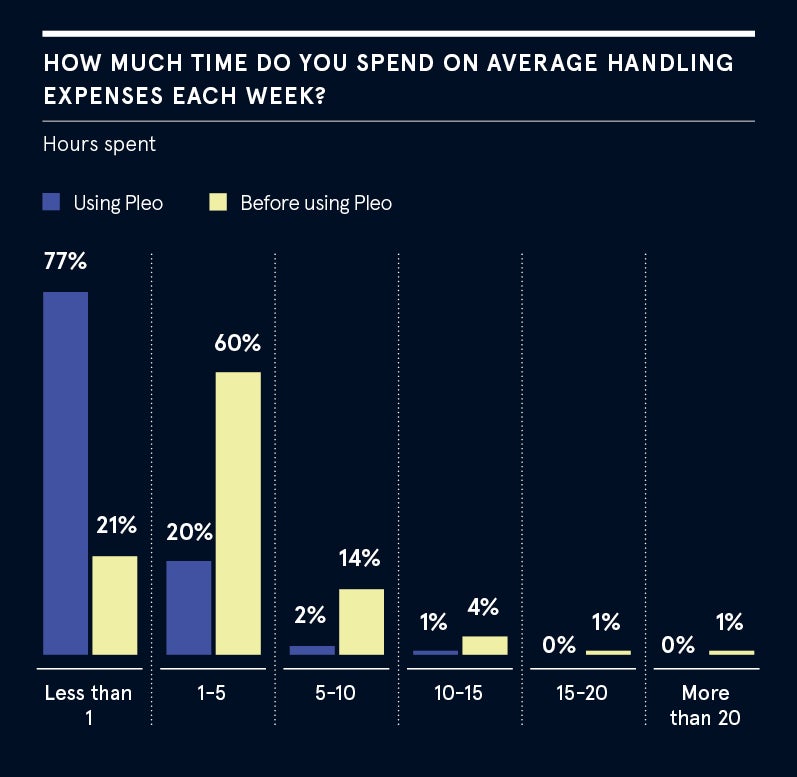Chief financial officers have long been bogged down by the time-consuming task of managing spend across the different departments in their organisation. With traditional expense management, finance teams have no real-time access to data and insights on company spending, leaving them struggling to control costs and keep up with necessary reporting.
Meanwhile, expense reporting is also a significant time-drain on employees, who find the need to pay out of their own pocket and wait for reimbursement disempowering. Some staff even use the cumbersome process, and knowledge of their employer’s poor oversight of spend, to their unseemly advantage by expensing private transactions, the wrong amount or the same purchase twice. Expenses are one of the biggest sources of fraud in businesses.
“There is so much time and money wasted in expense processes,” says Jeppe Rindom, a former CFO and now co-founder and chief executive at smart company card firm Pleo, whose platform eliminates the need for expense reports. “When I was a CFO, we had 100 employees using Skype on my credit card. Imagine asking 100 employees to log into their Skype account to download receipts and send them to us so we can reconcile. It’s insane.
“By the time you’ve collected and reconciled expenses and run your numbers, many weeks have passed. And why would any employees want to pay for the company, do a load of reporting and then wait for it to be reimbursed? It’s just not a beloved process in any sense.”

These pain points have fuelled a growing impetus among CFOs and organisations to modernise their approach to expense management and reporting. The changing dynamic of spending caused by the coronavirus pandemic has only accelerated this shift. Travel spending dropped massively in 2020, for example, while spending on online ads grew by 28 per cent, according to Pleo’s The State of Spending report.
A recent Pleo survey found three in four senior managers spend more than an hour a week on expense reports, with 14 per cent losing nearly a whole working day each week. The same study found Pleo’s platform, which simplifies bookkeeping through end-to-end automation, saves an average of 11.5 hours per month on expense management. The company’s customer base has almost trebled since 2019, now exceeding 16,000 businesses.
“We democratise spend management,” says Rindom. “With their own Pleo card, employees never need to pay out of pocket and when receipts drop into their email inbox, our technology categorises and passes them to finance through the accounting system. Employees can purchase what they need for their job without worrying about the process.”
The future of spend management is about acting on data and insights, and to do that well you need all spending in one product
While employees are empowered, CFOs get the control over company spending that they require and without draining their time. The ability to set certain safeguards on employee spending gives CFOs reassurance, though the best control comes from the real-time nature of the platform. When employees purchase something, both their manager and the finance team can see it immediately. The transparency means employees behave more responsibly.
In a recent study by Pleo, half of businesses said bill payments make up at least 75 per cent of their spend and the finance team is responsible for signing off the payments in two thirds of companies. With the launch of Pleo Bills, Pleo is now bringing its end-to-end automation to invoices as well as expenses, allowing companies to manage both through one tool. Crucially, this will enable CFOs to play a more strategic, value-added role for the business.
“The future of spend management is about acting on data and insights, and to do that well you need all spending in one product,” says Rindom. “By finally having all company spending in one platform, replacing manual processes with automation and real-time data, CFOs and the wider finance function have the time and the analytics to elevate their role.”
For more information please visit Pleo.io
Promoted by Pleo.io
Chief financial officers have long been bogged down by the time-consuming task of managing spend across the different departments in their organisation. With traditional expense management, finance teams have no real-time access to data and insights on company spending, leaving them struggling to control costs and keep up with necessary reporting.
Meanwhile, expense reporting is also a significant time-drain on employees, who find the need to pay out of their own pocket and wait for reimbursement disempowering. Some staff even use the cumbersome process, and knowledge of their employer’s poor oversight of spend, to their unseemly advantage by expensing private transactions, the wrong amount or the same purchase twice. Expenses are one of the biggest sources of fraud in businesses.
“There is so much time and money wasted in expense processes,” says Jeppe Rindom, a former CFO and now co-founder and chief executive at smart company card firm Pleo, whose platform eliminates the need for expense reports. “When I was a CFO, we had 100 employees using Skype on my credit card. Imagine asking 100 employees to log into their Skype account to download receipts and send them to us so we can reconcile. It’s insane.
“By the time you’ve collected and reconciled expenses and run your numbers, many weeks have passed. And why would any employees want to pay for the company, do a load of reporting and then wait for it to be reimbursed? It’s just not a beloved process in any sense.”

